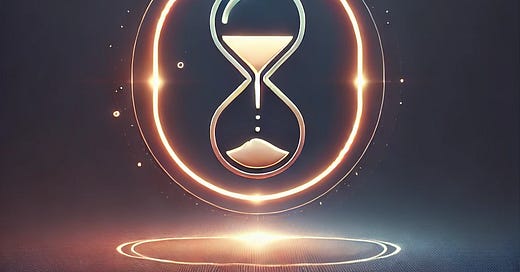the future is not a countdown
why our obsession with time is making us miss what actually matters
we have been conditioned to think of time as something we are running out of. every crisis is a countdown. every opportunity is a window to act.
act now before it’s too late.
or else.
this way of seeing time assumes the future is a straight road with only two possible destinations: progress or collapse.
but, what if time is not a straight line?
what if change is not a predictable march towards a predetermined outcome?
what if the future is not a script already written, but rather a field of possibility, shaped by conditions that are always shifting?
chronos vs kairos
In Western thought, time is often framed as chronos - sequential, measurable, and quantifiable.
This is time as we see it on clocks and calendars. It is the time of capitalism - deadlines, schedules, and productivity. Chronos is what tells us we are running late, that we are falling behind and that we have a deadline we must meet to get things right.
But there is another kind of time: kairos. Unlike chronos, which measures time, kairos reveals the right moment within time - the opportune moment when conditions align for something to happen. Kairos is the threshold. The opening. The moment when transformation becomes possible.
In complex systems, change does not happen on a set timeline. It happens when pressure builds, when relationships shift, when an unseen threshold is crossed. These moments are not dictated by schedules but by emergence - the natural unfolding of conditions that create the space for something new.
When we fixate only on chronos, we become trapped in an artificial urgency and linear thinking. But when we learn to recognize kairos, we shift from racing against time to sensing the openings within time.
…
Instead of asking “how much time is left?” We might ask “what conditions are shifting?” or “what possibilities are emerging?”
Because change does not happen at a fixed speed. It happens at thresholds. At moments when something becomes possible that wasn’t possible before.
To see this, we have to move beyond the anxiety of chronos and learn to sense the deeper rhythms of kairos.
impermanence and non-attachment
The belief in a fixed timeline comes from another illusion: the idea that things are stable until, suddenly, they are not.
We imagine that the world is mostly solid, that we are mostly in control, until a crisis disrupts that stability.
But this is not reality. We are not, nor have we ever been in control. The world is always shifting, always in motion. Impermanence is not an exception to the rule, it is the fundamental nature of existence.
When we resist impermanence, we create suffering. We try to hold onto certainty, to control outcomes, to force the world into a predetermined shape. And when the world does not conform, we feel fear, despair, or paralysis.
But, when we embrace impermanence, something shifts. Instead of seeing change as something that happens to us, we recognize it as something we are inside of — something we can participate in.
We stop clinging to one fixed idea of the future and instead become responsive to the movement of the present.
…
When we let go of the need for certainty, we stop hesitating. We stop waiting for proof that we are on the right path before we move forward. We act not because we are sure of success, but because action itself shapes the unfolding future.
Non-attachment does not mean detachment or apathy. It means engaging fully without clinging to a specific outcome.
hope is a four-letter word
Hope, as it is commonly understood, is attachment to a particular future. It is the desire for things to turn out a certain way, often accompanied by the fear that they won’t.
This creates a fragile relationship with the future - one that collapses into despair if reality does not conform to our expectations.
What if we didn’t need to feel hopeful?
Hope is simply an emotional attachment to one of many possible futures.
Despair is simply an emotional attachment to one of many possible futures.
They are morally equivalent. Neither one makes you better equipped to face a crisis.
Possibility thinking does not cling to one outcome, it holds space for multiple possible futures.
It recognizes that conditions are always shifting, that openings emerge where we least expect them, and that the path forward is not a single road but an ever-changing landscape.
prediction → participation
so, how do we participate in a world that is uncertain, emergent, and constantly shifting?
shift from linear thinking to relational thinking. Instead of seeing time as one straight path, recognize it as a web of interconnected conditions where change happens through thresholds and openings.
recognize possibility. Change does not move in a single direction. What is impossible today may be inevitable tomorrow.
exchange attachment for presence. Engage not because you are certain of the outcome, but because engagement itself creates new possibilities.
The future is not a countdown, it is a field of possibility. Our role is not to predict it, but to be present within it.



